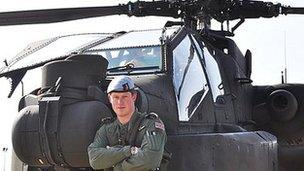Prince Harry finishes Army exercise in US
- Published

Prince Harry flew to the US to take part in the exercise at the start of October
Prince Harry has returned to the UK after completing a major exercise in the US, flying Apache helicopters with the Army, St James's Palace has said.
The prince spent eight weeks taking part in Exercise Crimson Eagle in California and Arizona.
He flew the aircraft in mountainous and desert conditions, during both day and night, as well as firing its weapons.
The exercise - designed to prepare pilots for action in Afghanistan - was the latest step in Harry's training.
Known to his fellow soldiers as Capt Wales, the 27-year-old must undergo more training at RAF base Wattisham Station, Suffolk.
'Demanding environment'
Exercise Crimson Eagle, split between US military bases in California and Arizona, was designed to prove students' proficiency in handling the Apache.
Lt Col Peter Bullen, chief of staff of the Attack Helicopter Force at Wattisham, said: "[It] is a challenging exercise during which students have had an opportunity to practise skills in a demanding environment with conditions similar to those in Afghanistan."
Harry was secretly flown to Helmand Province, southern Afghanistan, in December 2007 to work as a forward air controller, serving for 10 weeks.
The royal has spoken publicly a number of times about his wish to serve his country on operations.
Rockets and missiles
In April, while training for an Arctic expedition, he suggested it would be pointless to undertake costly helicopter training if he never went into combat.
He said: "You become a very expensive asset, the training's very expensive. I'd just be taking up a spare place for somebody else."
The Apache attack helicopter is designed to hunt and destroy tanks and is equipped with rockets, missiles and a machine gun.
St James's Palace has always stressed that the issue of the prince deploying on operations is a "matter for the Ministry of Defence chain of command".
- Published7 October 2011
- Published17 April 2011
- Published31 March 2011